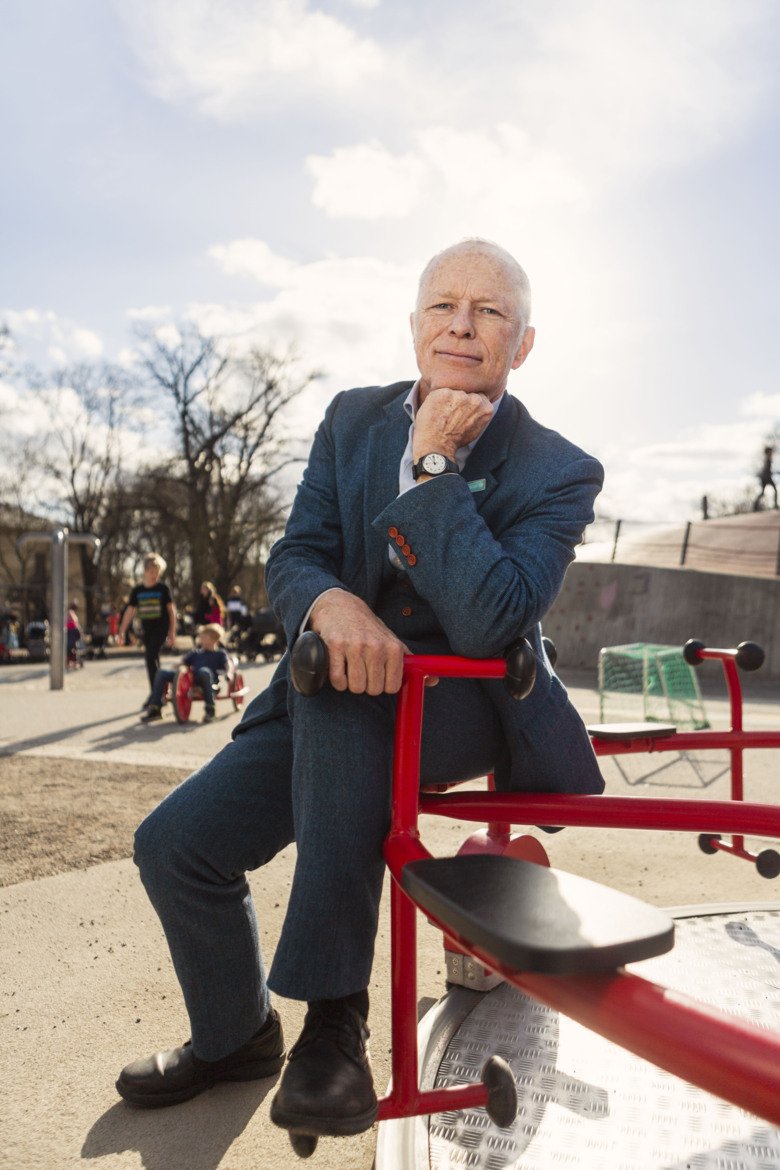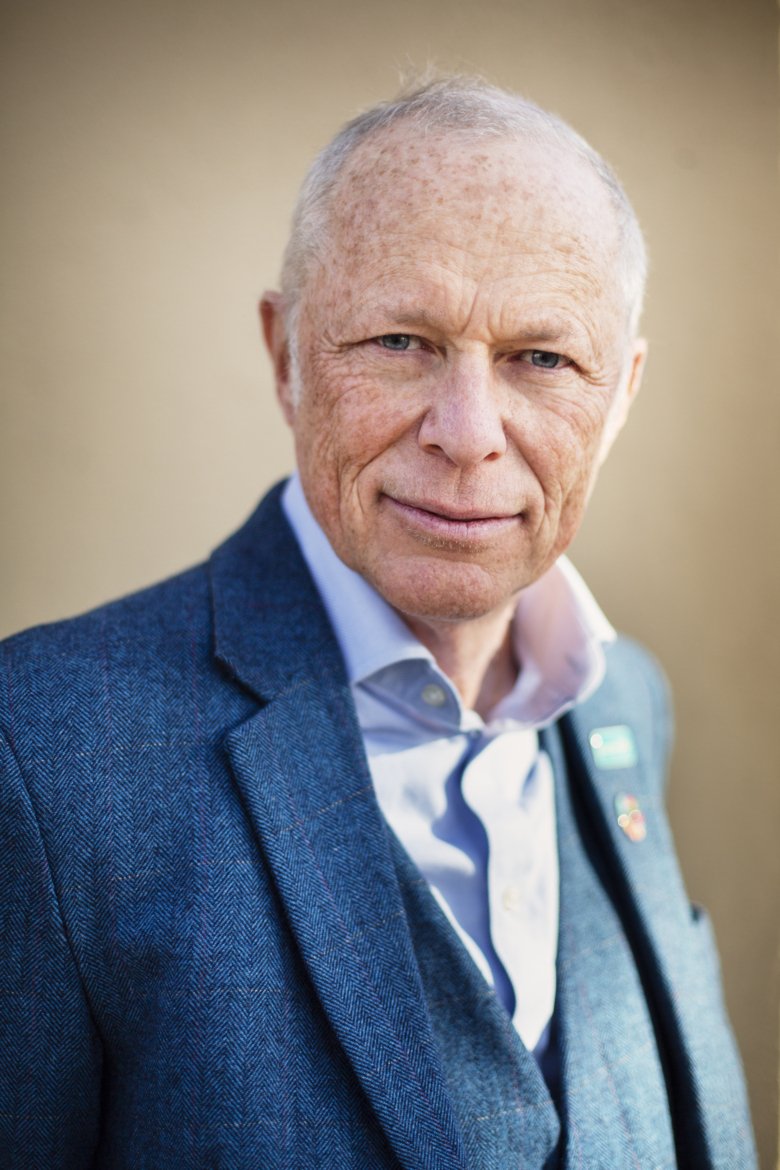He cares about children’s future
Professor Stefan Swartling Peterson isn’t interested in getting more papers published. No, he wants to spend the last ten years of his career helping to create a better future for all children. And time’s running out.

Text: Cecilia Odlind, first published in Swedish in Medicinsk Vetenskap, No 2/2021.
ARE MORE scientific papers really what it’s all about?
The question is asked by Stefan Swartling Peterson, who has spent many years researching global children’s care and who therefore has a good many publications already under his belt. In recent years he has become increasingly driven to make an actual difference.
“Even back when I was a young medical student I was fascinated by the fact that so many health problems are down to the slow transmission of knowledge. It’s only when the research is applied that it does any good,” he says.
TO GIVE AN example from his own research, Professor Swartling Peterson cites his studies with Makerere University in Uganda that have given rise to recommendations on how to care for and treat children with fever. In practical terms, this research has resulted in a flow chart that helps local health workers gather children’s health data, such as body temperature and respiratory rate. They are also to be attentive to acute warning signs, such as spasms, bloody diarrhoea and severe vomiting, so that the more seriously ill children can be sent to the closest clinic or hospital. The children that are not so sick are treated on site. There are also instructions for how disease can be prevented with education and prophylactic action.
“The flow chart has become WHO and UNICEF policy and is now used by many countries. This is an example of how you can work systematically to reduce global child mortality – one of the goals of the UN’s Agenda 2030*,” says Professor Swartling Peterson, who seems reluctant to get bogged down in theory.
“I’ve often felt in academic contexts that there’s a huge gap between my and other people’s research findings and their application. I now want to make a difference by improving the implementation of knowledge,” he says.
This was also one of the main reasons why he accepted the post of Global Chief of Health at UNICEF in New York, where he worked between 2016 and 2020.
Being in charge of the health of the world’s children is a major, not to say gigantic, undertaking.
“It is. It’s impossible and wasn’t the idea behind the assignment either. But sure, it could be stressful! When you have a post for a limited time, you want to make best use of that time,” he says.
HIS YEARS AT UNICEF he spent leading the A Future for the World’s Children? commission. The results, which were published in 2020 in the esteemed scientific journal The Lancet, showed that children in the Central African Republic are worst off. Norwegian children top the list of 180 countries, and Sweden comes in at 13. However, according to the report there is no country in the world that does enough to protect children’s health now and for the future.
“This is because no country has managed to combine sound childhood development with the sustainable use of resources. We must find a way to improve the lives of vulnerable children at the same time as we drastically reduce the extraction of resources from the planet, especially by rich countries, if we’re to achieve sustainability,” says Professor Swartling Peterson.
The report defines the problem: In certain parts of the world, infectious diseases and high child mortality are still serious problems. And while many children starve, others eat either too much or the wrong type of food. Sexual and reproductive ill-health, traffic accidents, mental illness and suicide are the cause of much suffering and death for many children.
“Our work also clearly showed that this is not simply a case of healthcare. New threats to children’s health are related, for instance, to environmental change and the aggressive marketing of harmful products. To achieve good health, we must work within all societal sectors to improve food, water, air, participation, education, communication and so forth,” he continues.
How this will come about is something that the researchers behind the Lancet commission intend to establish through the new initiative Children in All Policies 2030. One setback is, of course, the Corona pandemic, which has led to school closures, violence in the home and poverty and hunger. Professor Swartling Peterson thinks that the action being taken in African countries has often been blindly copied from richer countries, where the death tolls have been very much lower.
“In many parts of Africa the authorities have imposed a lockdown, sometimes despite a low rate of infection. Measures to slow down infection should have been better adapted to the local circumstances. For example, they could have supplied water tanks so that the poor could wash their hands, “Swished” money to individuals instead of handing out food from the back of a lorry where people crowd around, and informed and engaged people more. And they shouldn’t have closed schools and clinics.”
The long-term consequences of the lockdowns risk doing much more damage than good, he argues.
“They’ve sometimes stopped drugs and vaccines for a variety of diseases from getting where they’re needed. Child labour and the forced marriage of girls has increased. Over 160 million children haven’t been able to go to school for a year, according to a UNICEF report. It could turn out that children are the pandemic’s greatest victims,” he says.

We need to collaborate
His new role as professor of global transformation for health, an appointment he took up in the new year, will, he believes, present an opportunity to turn the “semi-abstract political goals” of Agenda 2030 into more concrete roadmaps – “missions for sustainable health”.
“And since this includes so many different parts of society, we have to start meeting across disciplinary boundaries and between different actors. Leaders have to meet children, researchers have to interact, companies must talk to universities, countries to each other and so on,” says Professor Swartling Peterson.
IN THIS RESPECT he sees himself as an academic matchmaker, a catalytic spider in the web.
“To meet people and bring them together is now my greatest challenge and task. A university’s job is to research and educate, but it’s also – equally importantly – to collaborate!”
It is particularly important for young people to be included in these efforts, which, he points out, are about their own futures, after all:
“They’re rarely asked, but children and teenagers must be involved in the decisions that affect their lives and will affect them in the future. The sustainable goals of Agenda 2030 must be based on the children’s perspective. Most importantly of all, we can waste no more time putting the brakes on global heating. It’s our duty to the younger generations,” says Professor Swartling Peterson.
We return to the urgency of the situation. There is roughly a decade to go before the “climate tipping points”, when dramatic and irreversible effects are likely if we fail to cut CO2 emissions, and before the UN’s Agenda 2030 deadline. And this is about what is left of Professor Swartling Peterson’s career.
“I can’t do everything. But together, we at Karolinska Institutet can do a lot,” he says.
Facts about Stefan Swartling Peterson
Name: Stefan Swartling Peterson.
Title: Professor of global transformation for health.
Age: 58.
Family: Wife and four children.
Motto: Make a difference!
How I like to relax: Go for walks in the woods.
Surprising interest: Forestry.
Role model: “I had the privilege to work close to Professor Hans Rosling for 20 years. He remains a daily guide and source of inspiration to this day. I often think about what Hans would have thought and done. It impels me to act: Whoever doesn’t take a stand and act is part of the problem, whatever the problem is. Hans taught me that.”
Stefan Swartling Peterson on …
… health:
Health is so much more than just healthcare. It’s about food, for example, and water, security, equality, climate, the environment, education and much more besides.
… children’s policy council:
Sweden has a climate policy council and fiscal policy council, and so we should have an independent council that judges the progress we’re making towards our goal for ALL children’s best.
… Fridays For Future:
We must make the best use of young people’s political engagement. I think we should lower the voting age to 16. This would put pressure on our politicians.
… twitter:
On @stefanswartpet I pick up things I’d have otherwise missed. But it’s also a way to reach out to people I would never otherwise reach, especially decision-makers.
